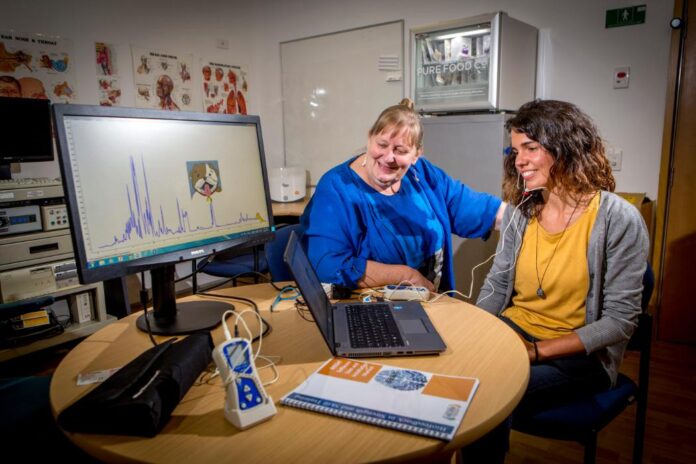Source: University of Canterbury
18 November 2021
University of Canterbury Professor Maggie-Lee Huckabee has been presented the MacDiarmid Medal by Royal Society Te Apārangi for sustained excellence in translational research to improve outcomes for individuals with swallowing impairment.
-
University of Canterbury Professor Maggie-Lee Huckabee and Esther Guiu Hernandez
Professor Huckabee’s research is focused on rehabilitating those who have difficulty swallowing as a result of stroke, brain injury or neurological disease. These patients have primarily suffered damage to the part of the brain that controls the swallowing reflex, and through her research and repurposing existing technology, she has shown that it’s possible to recruit undamaged parts of the brain to serve that function, using principles of neuroplasticity.
Early in Professor Huckabee’s career, electrodes were used around the neck and throat with the intention of strengthening the muscles needed for swallowing. Unexpected improvement was observed in a patient who had severe brain damage in the area of the brain normally associated with swallowing, and from here the technique of training another part of the brain to control swallowing was born.
The technology has since been refined into ‘a therapeutic videogame’ that allows patients to see aspects of their swallowing response on the screen. Through this, the patient learns to better control swallowing by controlling the image on the screen. Professor Huckabee says that offering a personalised view of swallowing for these patients allows them to visual what they are trying to achieve.
In 2014, Professor Huckabee founded the UC Rose Centre for Stroke Recovery and Research based at St George’s Hospital, Christchurch, a multi-disciplinary research and clinical facility with a focus on bioengineering applications for stroke rehabilitation. Patients visit from around the world to undergo intensive treatment using her biofeedback techniques. Evidence shows that early intensive treatment works best to rehabilitate swallowing in patients, and she is working to influence healthcare practice worldwide.
Her biofeedback rehabilitation protocol has been well received across Europe and Australasia, leading to development of the soon-to-be-released, app-based wireless system, allowing intensive home rehabilitation without increased associated healthcare resources.
Professor Huckabee collaborated with UC Engineering colleagues to develop this software platform and associated biomedical technologies. A startup company was launched earlier in the year and Professor Huckabee is the Director.
She also leads a stream of research focussed on increasing sensitivity and specificity of clinical and instrumental assessment methods. Included under this umbrella are comprehensive programmes of research evaluating cough-reflex testing in clinical assessment, and another programme of research evaluating the instrumental techniques of pharyngeal manometry and neuromuscular ultrasound. As the director of these research programmes, a series of postgraduate students have completed extensive research on validity and reliability of these assessment measures for translation to clinical practice.
One simple clinical test has been translated internationally for use in 13 countries. Another clinical test has resulted in decreased length of hospitalisation and rates of chest infection. Outcomes included decreasing pneumonia rates across New Zealand health boards from 28% to less than 10%, as well as decreasing the length of hospitalisation and bounce-back admissions, and returning patients to oral diet sooner. This $2.80 test resulted in an approximate $1.4million cost avoidance in the Canterbury DHB in the first year of implementation. Professor Huckabee is currently leading an interdisciplinary team to develop a point-of-care device for predicting chest infection, using machine learning algorithms drawn from physiologic and clinical data.
Professor Huckabee says she is very grateful to be selected as recipient of the MacDiarmid Medal.
“I may share celebration of this medal with good food and drink, around a table with my colleagues from the Rose Centre, being well aware that this simple pleasure would evade most of the patients we work for,” she says.
“So, as a clinician, turned clinical scientist, I am even more grateful that this award provides an opportunity to draw attention to the unseen, but not uncommon, condition of swallowing impairment. Greater recognition may ultimately facilitate improved clinical services and options for recovery for these patients. I owe huge gratitude to a long list of these individuals, who have taught me about their condition and that I need to listen to them if I want to be effective in helping them. A special toast to my colleague, Eric Knapp, who is the true expert on dysphagia following stroke.
“I’m also grateful to the University of Canterbury for being an academic home that mostly lets me get on with my work without intrusion or micromanagement but with good support when it’s needed.”
Professor Huckabee received her PhD in Speech Language Pathology at the University of Memphis in the United States, followed by a Fulbright Fellowship at the Department of Neurology in the General Hospital of Vienna, Austria. She joined the University of Canterbury in 2000. In 2020 she won ‘Best Canterbury Health Tech Solution’, has twice been nominated for New Zealander of the Year awards, and received the University of Canterbury Innovation Medal in 2014.
About the award
The MacDiarmid Medal is awarded annually to a person or team who, while in New Zealand, has undertaken outstanding scientific research that demonstrates the potential for application to human benefit, such as in the areas of health, environment and technology.



